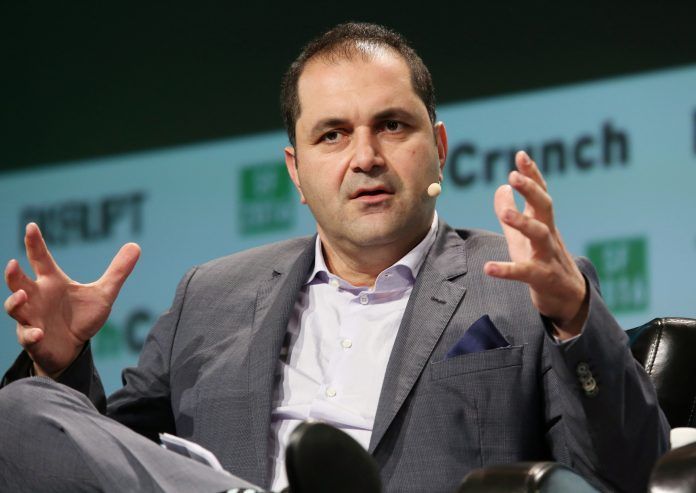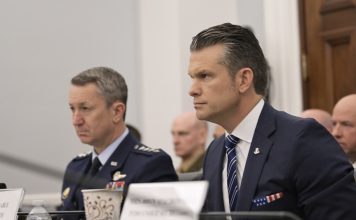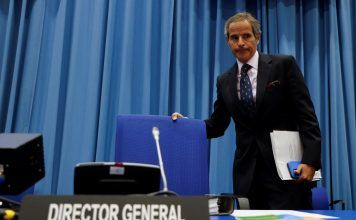
By Nazanine Nouri
Shervin Pishevar, the billionaire Iranian-American serial entrepreneur and investor, has watched Zoom, a company he’s invested in, thrive during the pandemic. He’s now hoping for more exponential growth with the launch of Zoom’s app store, “Zapps.”
Zoom has been one of the world’s fastest-growing companies during the Coronavirus epidemic, thanks to the global surge in Zoom corporate meetings, workouts, happy hours, yoga workouts, birthday parties and more. The company hopes that its new app store will allow developers to put up third-party “Zapps” that work in tandem with the company’s video chatting software.
“Zoom will be a $500B+ [company],” Pishevar tweeted on October 15, around the time of the Zapps launch. “Zoom is the Operating System for how business communicates and collaborates now. It’s a permanent displacement. Hundreds of billions of deals, partnerships & investments have been powered by Zoom. ZAPP Store will be as big as the App Store in 10 years.”
Zoom will be a $500B+ co. Zoom is the Operating System for how business communicates and collaborates now. It’s a permanent displacement. Hundreds of billions of deals, partnerships & investments have been powered by Zoom. ZAPP Store will be as big as the App Store in 10 years. https://t.co/hjcqTdM7oE
— Shervin (@shervin) October 15, 2020
Pishevar is a venture capitalist, super angel investor, and philanthropist. He was an early investor in Uber, Machine Zone, Warby Parker, Tumblr, Getaround and others. His investment in Uber paid off handsomely, helping turn him into a tech billionaire.
“If you’re going to invest in something, you have to love the product, the founders, the team, the company, the market,” he explained in his new podcast Start. “And if you don’t love any one of those things, most likely, it’s not going to be a great investment. One that’s going to change the world.”
“My greatest investments, my greatest experiences with companies and founders and teams and products and helping build global brands, have always been about the love. When founders and teams feel like they are supported and loved, guess what happens? They thrive. And they work through their mistakes. They learn, they grow. Because they feel like they can take the risk to be vulnerable, and to ask for help. To ask for mentorship.”
Born in Tehran in 1974, Shervin spent his early childhood in Iran with his two siblings, Afshin and Bita.
“I’m a child of revolution and war,” he said on the Pomp Podcast in June. “I remember bombs falling on Tehran as a six year old. The bomb sirens going off, anti-aircraft shooting, red streaks in the sky, everybody going into the basement with candles, and the fear in people’s eyes.”
[aesop_image img=”https://kayhanlife.com/wp-content/uploads/2020/11/2016-05-11T120000Z_2098951778_S1BETDMLYGAA_RTRMADP_3_USA-HYPERLOOP-TEST-scaled.jpg” panorama=”off” credit=”FILE PHOTO: Hyperloop One co-founder Shervin Pishevar speaks to reporters following a propulsion open-air test at Hyperloop One in North Las Vegas, Nevada, U.S. May 11, 2016. REUTERS/Steve Marcus” align=”center” lightbox=”off” captionsrc=”custom” captionposition=”left” revealfx=”off” overlay_revealfx=”off”]
His father had worked for the Shah as head of radio intelligence for part of the country, and “actually made some brave decisions: he [set up] foreign-language broadcasts for embassies for people to know how to get out of the country, and he saved lives.” As a result, he landed on the Islamic Republic’s wanted list, and was forced to go underground and hide. He fled Iran, leaving his family behind.
His escape was made possible thanks to a friend from his hometown on the Caspian Sea, a poor man from a religious family whom he had helped with a job years earlier. This man, who by the time of the revolution had become head of security for the airport, reached out to Shervin’s mother offering help. He arranged to meet Shervin’s father at the airport and walked him through security onto an Air France flight and out of the country, thus allowing him to narrowly escape execution.
Shervin’s father went to the US, where he became a cab driver in Silver Springs, Maryland.
“Life became very real and dramatic quickly,” Shervin recalled. The family were unable to see their father for two years, during which time the Iran-Iraq war broke out. Afterwards, the family was reunited in Washington D.C..
Years later, in July 2019, Shervin tweeted a photo of himself on arrival in the U.S., and wrote:
“7 year old me, a year after escaping Iran-Iraq War. My 1st suit. Clip on tie. A year before this I was witnessing nightly bomb raids in Tehran. God Bless America. Immigrants/refugees were once welcomed. Here’s to protecting the children like me who came here for a better life.”
7 year old me a year after escaping Iran-Iraq War. My 1st suit. Clip on tie. A year before this I was witnessing nightly bomb raids in Tehran. God Bless America. Immigrants/refugees were once welcomed. Here’s to protecting the children like me who came here for a better life. pic.twitter.com/uTxOaPJuGC
— Shervin (@shervin) July 8, 2019
Shervin’s story is the perfect example of the American dream. “I went from English for speakers of other languages as I didn’t know any English, to ‘Gifted and Talented,’ and then to a Magnate School where I was lucky to get access to Next computers,” he recalled on the podcast. “My dad worked overnight shifts and so did my mom so they could buy me an Apple IIc, my first computer. That changed my life. Never looked back.”
Shervin earned a degree in molecular biology at the University of California Berkeley. While at university, he created and patented a method for lysing malaria-infected red blood cells; co-authored an article in the Journal of American Medical Association that led to the first set of international guidelines for the documentation of torture; and founded and served as editor-in-chief of the Berkeley Scientific Journal.
Despite his aptitude at biotech, and his parents’ desire for him to pursue a career in medicine, Shervin decided to become an entrepreneur. In 1997, he formed his first company, WebOS, which pioneered the concept of a Web-based operating system. He developed a knack for investing early on, buying into technology startups that shook up traditional industries.
He then founded and operated Webs.com, which was acquired by VistaPrint, SGN (now JamCity), and HyperOffice. The companies he founded reached an aggregate of more than 100 million users.
“I remember when I made my first little bit of liquidity,” he explained on the Pomp podcast. “It was like the first time I ever had any liquidity. It was about $4 million. This was like going from nothing to like, wow, I just sold a company and I got $4 million, WOW. And I never felt what ‘[F-word] you’ money was until that moment. I couldn’t understand it. There is no way you understand it until you have it. It is a liberation of the soul, because at that point you can walk away.”
In 2011, he joined Menlo Ventures, a San Francisco-based venture capital firm with more than $4 billion under management. As managing director, he led key early investments in such companies as Uber, Machine Zone, Warby Parker, Tumblr, Getaround and others. His purchase of a $26 million stake in a small ride-hailing app called Uber boosted his reputation in the industry, as the stake went on to be worth billions of dollars.
Pishevar put every dollar of his own money ($4 million) into Uber as well, because that was “the right thing to do.”
“I was willing to risk it all,” he recalled, and “put all the chips on one thing, and it could have gone badly, but it didn’t.”
He left Menlo Ventures in 2013 and co-founded Sherpa Capital, a venture-capital fund based in the San Francisco Bay Area. As general partner, he helped raise and invest over $650 million in three funds between 2013 and 2017. He resigned from Sherpa Capital in December 2017 following allegations of sexual misconduct, which he denied, stating that they were part of an “organized smear campaign” led by unnamed business rivals.
Pishevar was also the co-founder and first executive chairman of Virgin Hyperloop One. Virgin Hyperloop One was established in 2014 to commercialize a high-speed technology concept developed by Elon Musk known as Hyperloop — a pressure-controlled tube allowing a pod full of people and cargo to travel through it at speeds of up to 700 miles per hour (going from Los Angeles to San Francisco in 35 minutes), propelled by a highly efficient solar-powered motor.
It was during a trip to Cuba with Elon Musk and Sean Penn to release a jailed American hostage that he and Musk started talking about Hyperloop. While on Elon’s jet (which was only the second American plane to land in Cuba in 50 years), Pishevar asked Musk if he was willing to create a company around the Hyperloop, and Musk gave him the go-ahead. “My idea was that I didn’t want to just do people transport, I wanted to revolutionize the idea of logistics, cargo and commerce,” he told the Pomp Podcast.
Pishevar stepped down as executive chairman in December 2017 following the sexual misconduct allegations.
Since 2017, he has been co-founder and managing director of Sofreh Capital, a wealth management firm based in Miami Beach, Florida.
Pishevar was awarded the Ellis Island Medal of Honor in 2016 and was appointed by President Obama to the Fulbright Foreign Scholarship Board in 2015. He was the U.S. Citizenship and Immigration Services’ “Outstanding American by Choice” recipient in 2012 and one of the 10 members of the UN Foundation’s Global Entrepreneurs Council in 2011.
He has served as entrepreneurial ambassador on several U.S. Department of State delegations to the Middle East and Russia and was a member of the Technology, Media and Telecommunications policy working group that helped create the Obama Technology and Innovation Plan in 2008.
At 46, looking back on his life to date, Pishevar is most proud of the fact that his investments “have returned billions of dollars to a lot of LPs [Limited Partnerships] that are retirement funds of our grandparents and nonprofits that are doing really good work in the world.”
“My measure of billions is not what I’m acquiring,” he said on the Pomp podcast, “but how I’m contributing to the cycle of giving and helping to fund these incredible institutions and nonprofits, pension funds that are the livelihood of humanity, that put bread on the table of people’s homes.”
As a philanthropist, Pishevar has donated money, time and leadership to numerous global and local charities, including charity:water; the Malala Fund; UNICEF; 1% of Nothing; Build.org; and Invisible Children.
In 2014, he launched the Cyrus Prize (named after Cyrus the Great) to celebrate and inspire Iranian culture and entrepreneurship and awarded the first $100K grant to Dropbox co-founder Arash Ferdowsi. Quoting Cyrus the Great during the award ceremony, Pishevar noted:
“Success always calls for greater generosity — though most people, lost in the darkness of their own egos, treat it as an occasion for greater greed. Collecting boot [is] not an end itself, but only a means for building [an] empire. Riches would be of little use to us now – except as a means of winning new friends.”







